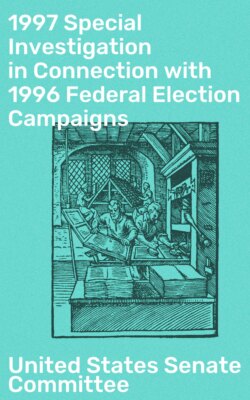Читать книгу 1997 Special Investigation in Connection with 1996 Federal Election Campaigns - United States Senate Committee - Страница 27
На сайте Литреса книга снята с продажи.
John Huang
ОглавлениеTable of Contents
Because of his central role in raising so much of the foreign money returned to date by the DNC, and because of his long relationship to the Lippo Group, the Committee examined in detail John Huang’s fund-raising activities and his service at the Department of Commerce. Huang began involving himself in U.S. politics in 1988 while an official at LippoBank, working with James Riady, Hsia, and others to found the Pacific Leadership Council (“PLC”), an Asian- American interest group and political fund-raising organ, which organized a trip to Taiwan (and the Fo Kuang Shan temple there) for then-Senator Gore. Huang’s colleagues at LippoBank -- where he served as President and Director -- never understood his corporate duties and described him as a “mystery man.”
After the election of 1992, with Riady’s encouragement, the White House placed Huang on its list of “high priority” candidates for political appointment. In a letter to Deputy Director of Presidential Personnel John Emerson, Democratic activist Maeley Tom recommended Huang for a government position, describing him as
the political power that advises the Riady family on issues and where
to make contributions. [The Riadys] invested heavily in the Clinton campaign. John is the Riady family’s top priority for placement
because he is like one of their own.
Huang was hired in 1993 as Deputy Assistant Secretary for International Economic Policy at the Department of Commerce.
The work Huang actually performed in his new job, however, was apparently as perplexing to his colleagues at the Commerce Department as it had been to his associates at LippoBank. During the 18 months that Huang worked at the Department, in fact, he left virtually no mark; many of his colleagues found themselves wholly at a loss to explain what he did.
Despite his superiors’ attempt to “wall off” Huang from matters relating to China, Huang received regular classified briefings that included the greater China area. Without his superiors’s knowledge, Huang received 37 intelligence briefings, viewing 10 to 15 intelligence reports at each session—a total of 370 to 500 items of “raw intelligence” during his tenure. Also unbeknownst to his superiors, Huang made multiple visits and telephone calls to the Chinese Embassy while at Commerce. And despite Huang’s status as only a mid-level official at Commerce, he made at least 67 visits to the White House, often meeting with top officials and receiving briefings on trade policy.
Equally mysterious were the over 400 contacts Huang had with Lippo officials while he worked at Commerce: 237 phone calls to LippoBank and affiliated entities in the United States, calls and fax transmissions to Lippo’s Indonesian headquarters, and an additional 107 calls to such countries as China, Indonesia, Taiwan, and Hong Kong. Huang may have made more such calls from the Washington office of Stephens, Inc. — an investment banking firm based in Little Rock, partly owned by the Riady family, which had extended loans to help finance President Clinton’s 1992 campaign—located across the street from the Commerce Department. Huang secretly used this Stephens office two or three times a week to make calls, pick up or deliver faxes, and send packages. Jeffrey Garten, Huang’s superior at Commerce, and John Dickerson, the CIA liaison to Commerce who provided Huang’s numerous classified briefings, were unaware of Huang’s continuing contacts with Lippo.
The full scope and import of Huang’s activities while at Commerce may never be known: he has invoked the Fifth Amendment and refused to cooperate with the Committee, Riady has left the country, and many of his former LippoBank colleagues have returned to Indonesia. The volume of Huang’s contacts with Lippo and the Chinese embassy, however, is cause for concern. The Committee has found no direct evidence that Huang passed classified information, but he had the opportunity to do so and his activities have not otherwise been adequately explained.
